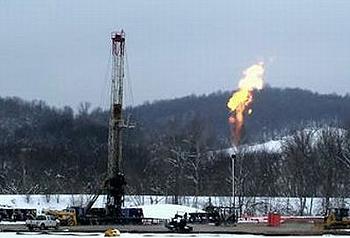
SEATTLE, Washington, January 4, 2013 (ENS) – Genetically modified bacteria are the central feature of a newly funded research project that aims to convert the methane found in natural gas to liquid diesel fuel for transportation.
An international consortium of scientists says that if methane gas can be turned into a liquid, it could be piped to refineries where it can be made into diesel suitable for trucks and cars, or airplane jet fuel.
Their proposal to develop a microbe that eats the methane in the gas has won a $4.8 million Advanced Research Projects Agency – Energy (ARPA-E) award from the U.S. Energy Department.
The University of Washington is taking the lead and focusing on genetically modifying microbes called methanotrophs that grow naturally on methane. They have a natural ability to make fats, or lipids, from the gas.
But the unmodified microbes can’t naturally produce enough lipids to yield a commercial profit without some help from genetic engineers.
The UW team aims to genetically engineer the methanotrophs to increase the amount of lipids and also to produce non-phosphorous-based lipids that are easily converted to fuels.
“The product that we’re shooting for will have the same fuel characteristics as diesel,” said principal investigator Mary Lidstrom, a UW professor of chemical engineering and microbiology. “It can be used in trucks, boats, buses, cars, tractors – anything that diesel does now.”

The UW engineers will work with scientists at the Department of Energy’s National Renewable Energy Lab and two industry partners. They will target the natural gas associated with oil fields, which is often flared off as waste, as well as so-called stranded natural gas reserves that are too small for a pipeline to be economically viable.
The amount of natural gas flared or vented from oil wells globally is equal to one-third of the amount of petroleum used in the United States each year. And methane is a potent greenhouse gas. Every molecule of methane vented to the atmosphere in that process has the global-warming capacity of 12 molecules of carbon dioxide.
Each of the four project partners has a distinct role.
First, the UW team will develop a version of the bacteria that efficiently converts methane to energy rich fat-like molecules.
Then LanzaTech, Inc., an Illinois-based pioneer in waste-to-biofuels technology, will develop a way to grow the genetically modified bacteria in large quantities at high efficiency.
“The direct conversion of methane to diesel has the potential to dramatically increase energy supply while mitigating greenhouse gas impact,” said Dr. Jennifer Holmgren, CEO at LanzaTech. “We are excited to partner with such a strong team and to have the opportunity to leverage our commercial gas fermentation expertise in this new sector.”
Next the National Renewable Energy Lab in Golden, Colorado will devise an efficient way to extract the energy-rich molecules from the microbe’s cells. NREL will be in charge of fermentation to demonstrate the productivity of the bacteria, both the natural organisms and the genetically-altered varieties.
“We’ll be leveraging our decades of experience in producing biofuels and lipids, which in the past we’ve typically done via algae,” said Phil Pienkos, NREL’s principle investigator on the liquid-to-diesel project.
“Here, we’ll be applying it to a brand new feedstock, natural gas. It would be a good feedstock for a refinery,” Pienkos said.
NREL will extract the lipids from the bacteria and analyze the economic potential of the plan.
Finally, partners at Johnson Matthey, a British chemical company, will use chemical catalysts to convert the lipids in the methane into fuel.
LanzaTech has signed on to take the bench-scale plan to the commercial level, if it is successful.
Copyright Environment News Service (ENS) 2013. All rights reserved.
© 2013, Environment News Service. All rights reserved. Content may be quoted only with proper attribution and a direct link to the original article. Full reproduction is prohibited.
